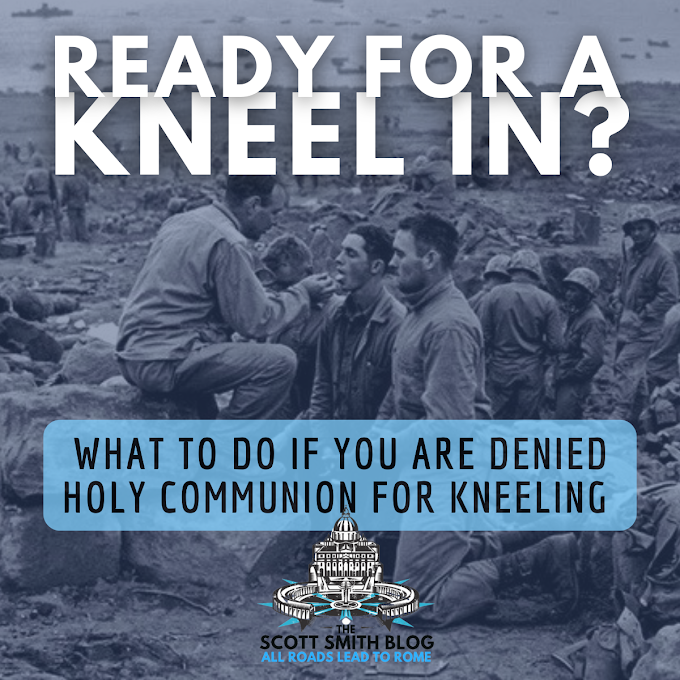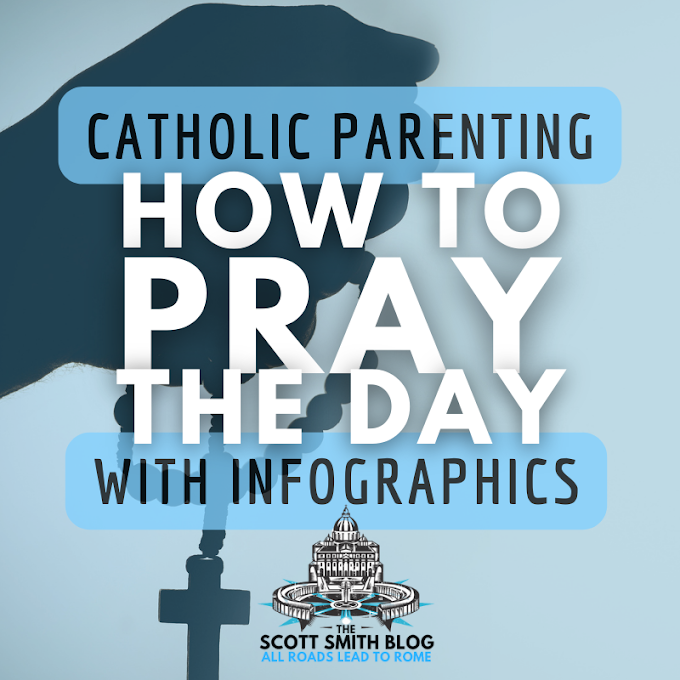Catholics have the privilege of living
a faith consistent with the WHOLE Bible, i.e. we don't "proof-text." There are a number of Christian
churches out there, as well as non-believers, who hone in on one verse in
particular to the detriment of all others. This is called
"proof-texting," or is at least the dark underbelly of proof-texting.
Have you ever heard the phrase "a text without a context is a pretext for a proof text"?
 Protestants identify this verse as
their Second Commandment, and Catholics include it as part of the First
Commandment. Protestants say, according to this, that Catholics are
idol-worshipers because we have statues of angels and saints in our churches.
However, if God intended to prohibit His people from making any and all graven
images, why did He command Moses – just after giving him the Ten Commandments –
to adorn the Ark of the Covenant with two golden statues of angels?
Protestants identify this verse as
their Second Commandment, and Catholics include it as part of the First
Commandment. Protestants say, according to this, that Catholics are
idol-worshipers because we have statues of angels and saints in our churches.
However, if God intended to prohibit His people from making any and all graven
images, why did He command Moses – just after giving him the Ten Commandments –
to adorn the Ark of the Covenant with two golden statues of angels?
Have you ever heard the phrase "a text without a context is a pretext for a proof text"?
The biggest problem with proof-texting
is the taking of verses out of their proper context. Oftentimes, people will
interpret a particular verse to mean something in direct contradiction to the
verses before and after it. Catholics interpret the Bible canonically, which means
that our interpretation of a verse cannot conflict with what the rest of the
Bible teaches. Otherwise stated, the Bible, being the Word of God, does not and
cannot contradict itself.
What if we tried proof-texting with other books?
This holistic method, by the way, is the only one which makes sense. What if we were to proof-text books other than the Bible? Here's a mini-TOP THREE before we get to the TOP TEN:- Dr. Seuss' Lorax, the bittersweet anthem of environmentalists,
states the following: "Business is business! And business must grow
regardless of crummies in tummies, you know." You see? Dr. Seuss
actually wanted the Truffula trees cut down and the Bar-ba-loots to
starve.
- Betty Friedan states in The Feminine
Mystique, the bedrock of second wave feminism, that
"truly feminine women do not want careers, higher education,
political rights (...)" (16).
- Little Women includes this line: "It is as useful to educate a woman as it is to educate a female housecat." Ah-ha! Louisa May Alcott, the proto-feminist, is against the education of women!
The above interpretations are
ridiculous, are they not? So why would we interpret the Bible like this?
The Worst (and Most Common) Examples of Proof-Texting
I've compiled the following TOP TEN
list of the worst examples of proof-texting. Catholics are confronted with
these verses, not just from fellow Christians, but from atheists as well (check
out the one on child sacrifice). I hope we will all be better prepared to
answer for these poor pieces of logic next time around.
- Romans 3:28: "Man is justified by faith apart from the observances of the law [apart from works]"
This is the great divide between
Protestants and Catholics: Luther’s new doctrine of sola fide, salvation by faith alone. Catholics argue that works are
also important for salvation. The
best counter-verse here is James 2:22: “Faith without works is dead” (See also
Mt 5:16). Clearly, something more is required than faith alone.
- John 6:64: “The flesh is of no avail.”
Ulrich Zwingli, one of the Protestant
Reformers, infuriated even Martin Luther when he used this verse to contort
Jesus’ whole Bread of Life sermon. If the "the flesh is of no avail,”
Zwingli argued, the Eucharist is only symbolically the flesh of Christ. The
problem is that Jesus said “THE flesh is of no avail,” but HIS flesh is “life
for the world” and “real food.” Moreover, Jesus let those of his disciples go,
who refused to believe the very literal meaning of his words.
- Matthew 7:1: "Judge not (…)"
Especially following the Supreme
Court’s ruling on gay marriage, Catholics have been attacked with this verse
for supporting traditional marriage. If Jesus commanding us not to exercise
judgment at all – even good judgment? If we’ve been commanded never to judge,
then we need to get rid of judges and
the whole legal system, as well.
- Exodus 20:4-6: “You shall not make for yourself a graven image (…)”
 Protestants identify this verse as
their Second Commandment, and Catholics include it as part of the First
Commandment. Protestants say, according to this, that Catholics are
idol-worshipers because we have statues of angels and saints in our churches.
However, if God intended to prohibit His people from making any and all graven
images, why did He command Moses – just after giving him the Ten Commandments –
to adorn the Ark of the Covenant with two golden statues of angels?
Protestants identify this verse as
their Second Commandment, and Catholics include it as part of the First
Commandment. Protestants say, according to this, that Catholics are
idol-worshipers because we have statues of angels and saints in our churches.
However, if God intended to prohibit His people from making any and all graven
images, why did He command Moses – just after giving him the Ten Commandments –
to adorn the Ark of the Covenant with two golden statues of angels? - Romans 3:23: “For all have sinned and fall short of the glory of God.”
This is the number one verse Catholics
hear to refute the Immaculate Conception of Mary. But wait – if “all have
sinned,” does that mean Jesus, too, sinned? Clearly, given the preceding
verses, Paul is saying here that Jews are not superior, sin-wise, to Gentiles.
- Matthew 23:9: "Call no man your father on earth, for you have one Father, who is in heaven"
I knew a girl in college who actually
dropped out of RCIA because a Protestant said Catholics violated this verse.
Well, so much for the Fourth Commandment! If this verse means we can call no
man “father” ever, we cannot even
call our dads “father” – or even “dad” for that matter. This verse is a
reproach to Pharisees who seek the honor of being called father or Rabbi
(meaning teacher) without the requisite humility.
- Ephesians 5:22: “Wives must obey their husbands as they would obey the Lord.”
Radical feminists hate this verse.
Ephesians 5:25 is the other half of the equation: “Husbands, love your
wives, as Christ loved the church and gave himself up for her.” Wives,
therefore, should obey their husbands insofar as they are Christ-like, and
husbands must be willing to sacrifice everything for their wives and families,
as Christ did on the cross.
- Genesis 22: The Sacrifice of Isaac
I *kid* you not – atheists claim this is
a promotion of child sacrifice. God commands Abraham to sacrifice his son:
"Take your son, your only son Isaac, whom you love, and go to the land of
Moriah, and offer him there as a burnt-offering on one of the mountains that I
shall show you." (Genesis 22:2)
| The Sacrifice of Isaac - Jacob Jordaens |
But there’s a problem! Isaac is not a
boy. Many people don’t realize this, since Isaac is often depicted in this
scene as a little boy and Abraham as an old man with a long beard. There are a
few problems with this. First, the Hebrew word often translated as “boy” in
Genesis 22 is the same word used for Abraham’s servants. This same word could
mean a male baby up to a young adult, even to age of Jesus at his crucifixion,
where he, too, carried the wood of his sacrifice. This brings us to the second
point, how could a little boy be strong enough to carry the wood of the
sacrifice up the mountain? Ultimately, we see that Isaac, who foreshadows
Jesus, was a willing sacrifice, who could have easily overpowered the much
older, Abraham.
- Acts 2:38: “Be baptized, every one of you, in the name of Jesus Christ, to have your sins forgiven.”
Pentecostals and other fundamentalist
Christian denominations baptize ONLY in the name of Jesus, NOT “in the Name of
the Father, and the Son, and the Holy Spirit.” This is very odd given that
Jesus, himself, instructs the Eleven
Apostles in Matthew 28:19 to baptize in all three names. This is also why
Pentecostals need to be re-baptized when becoming Catholic.
- 1 Timothy 2:5: “There is one God and one mediator between God and men, the man Jesus Christ.”
Confessing sins to a priest has been
called blasphemy based on this verse. It is true that no one but Christ unites,
within his very being, divinity and humanity. Nevertheless, Christ himself
grants his apostles authority to forgive sins and to teach on his behalf, i.e.
subordinate mediation. After his Resurrection, Jesus breathed on his disciples,
saying “Receive the Holy Spirit. If you forgive the sins of any, they are
forgiven; if you retain the sins of any, they are retained” (John 20:22-23). And
again, as St. Paul says in Galatians 2:20, “It is not I, but Christ who
[teaches] in me…”











10 Comments
The nations around the Jews worshiped images. Yahweh's intent was to keep his people's worship clean from such practices. The cherubs on the ark were objects of decoration, not worship. [Same with the decorative images of pomegranates, also specified by Yahweh.]
Any visitor to a Catholic church can see people worshioing statues, by praying to them, garlanding them for processions on their "days", burning candles in front of them ...
Observant non-Catholics say, 'If it looks like a duck, walks like a duck, then it's idol worship.'
1Tim 2:5. The publications of the Church often refer to Mary as "mediatrix". This is a title that the Bible does not give her, which she did not ask for, and which makes Jesus a liar.
Mt 28. "Jesus, himself, instructs the Eleven Apostles in Matthew 28:19 to baptize in all three names." I'm curious: Just what are those three names?
It was the focal point of correct worship of the invisible God, Yahweh; it was not itself an object of worship. It was also a repository for some items that reminded the Jews of their debt to God for their salvation out of Egypt. David ordered the ark moved unnecessarily and improperly [by hand; not in its wagon], or it would not have been upset. Uzzah paid the price for David's impatience and his own rashness in disobeying the rules for proper handling.
Statues: Anyone may worship God properly at any time by approaching him in prayer through his son. Anywhere, anytime. No statue required. When religious leaders install a 'representation of any creature' in a church and set the people to praying to it [in front of it, gazing on it, talking to it], this is an act of worship. It is a duck. Try taking away the statues and watch the reactions; you'll see why Paul counseled Christians to 'walk by faith and not by sight'.
When Pliny the younger sent out soldiers to shut down this 'troublesome sect' calked "Christians", his men came back to express their puzzlement. 'These people have no gods in their places of worship!' That is, they had no statues. For this reason they were persecuted as "atheists". This was tantamount to treason, since the "real" gods of the nation would be offended. If you won't read ypur Bible then at least read your history - so you won't be condemned to repeat it.
Mediatrix?
Names? Here's a start: the son's name is Jesus.
[Quote] Notice some of the important parts of this passage. Adonijah "prays" to Bathsheba, the mother of the King, that she would ask the King to grant Adonijah's "request." This may not be the definition of "pray" we're accustomed to hearing. Adonijah is not "praying" to Bathsheba as if she were God. To "pray" simply means to "ask" or to make a request. Also, notice that Adonijah knows that the king "will not refuse" his mother. How does he know this?[end quote]
In your excitement you remembered the questions but forgot to answer them.
Your smarmy equating of pray and ask seems close to violating your anathema on quoting out of context. Context tells us which meaning is intended.
Hers why I asked about names. The command - it's sometimes called "the great Commission" at Mt 28:18ff - says "name of" three times. Scripture shows us that the Father's name is Yahweh* and that his son's name is Jesus. Scripture shows us that the name of the holy spirit "person" is ...
Well, just what is it, anyway?
*The RCC is busy eliminating it from its flagship Bible, the NJB. The American Bishops, over at their UCSSB site, have a letter explaining why.
Goodbye.